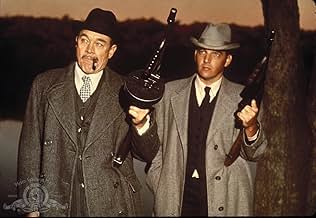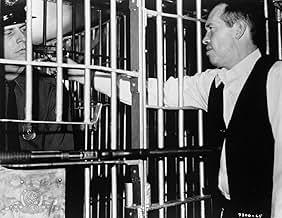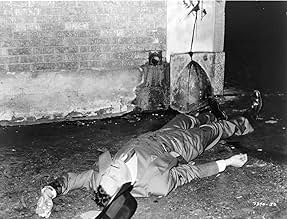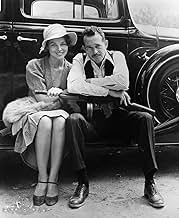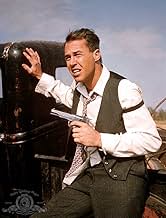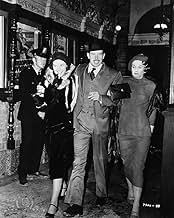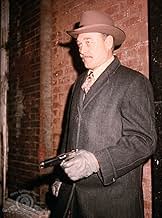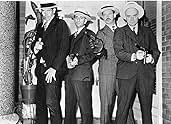IMDb-BEWERTUNG
6,9/10
6226
IHRE BEWERTUNG
John Dillinger und seine Bande begeben sich auf einen Bankraub im Mittleren Westen.John Dillinger und seine Bande begeben sich auf einen Bankraub im Mittleren Westen.John Dillinger und seine Bande begeben sich auf einen Bankraub im Mittleren Westen.
- Auszeichnungen
- 1 Nominierung insgesamt
John P. Ryan
- Charles Mackley
- (as John Ryan)
Jules Brenner
- Wilbur Underhill
- (Nicht genannt)
David Dorr
- Leroy
- (Nicht genannt)
Roland Bob Harris
- Ed Fulton
- (Nicht genannt)
George O. Heath
- John Dillinger, Sr.
- (Nicht genannt)
Empfohlene Bewertungen
My review might be a little biased because I love Warren Oates and will watch anything he appears in (including obscure movies like 92 In the Shade). However, I'd like to say that this is a very well-made gangster flick that rivals Bonnie & Clyde in entertainment value. I actually prefer the action sequences in Dillinger to the famous ones from Bonnie & Clyde because they seem rougher, more natural and less self-conscious. The shooting sequences in Bonnie & Clyde seem too choreographed and slightly pretentious in comparison. Another selling point for Dillinger is that it contains wonderful performances by Oates and Ben Johnson. Actually, Ben Johnson almost steals the show as "G Man" Melvin Purvis. Even though they only have 1.5 scenes together, Oates and Johnson complement each other nicely here.
Director John Milius also takes writing credit for this very colorful look at the most famous bank robber John Dillinger(Warren Oates). This story begins in the middle of his criminal career ending in his death at the Biograph Theater. This is a very romanticized tale complete with Baby Face Nelson(Richard Dreyfuss) and Pretty Boy Floyd(Steve Kanaly). Ben Johnson plays FBI agent Melvin Purvis who has an ego to match Dillinger's. Cloris Leachman plays Anna Sage, the infamous Woman in Red. Throw in Michelle Phillips as a girlfriend and Harry Dean Stanton as minion Homer Van Meter and you have the key players in this very colorful and violent movie. Liberty is taken with history for entertainment sake and besides the profanity filled script is not the selling point...the manic gun battles get most of the attention. The gun play is bloody and frequent; some of the roughest ever filmed. For a less colorful, but very interesting version check out DILLINGER(1945)starring Lawrence Tierney.
Like his predecessor in this role (Lawrence Tierney), this John Dillinger - Warren Oates - also looks the part. Oates is a rough-looking ugly mug and convincing in the lead role. Speaking of mugs, also included in this gangster flick are a few other criminals of the era: Baby Face Nelson and Pretty Boy Floyd.
Ben Johnson, meanwhile, is interesting as Melvin Purvis, the FBI who tracks down the famous Public Enemy Number One. Johnson also narrates in part of the film.
Oates does a fine job of playing Dillinger. Unfortunately - remember this is the '70s, a decade in which the "anti-hero" was a full bloom - the film tends to make this crook into a sympathetic figure. The screenwriters tell us, "Hey, folks, see this criminal really wasn't a bad guy! Gve him some slack!" Yeah, right.
A few minor acting notes: Cloris Leachman gets third billing, but only has a small role at the end as the famous "Lady In Red." Michelle Phillips, who made a name for herself as a member of the Mamas and Papas singing group, did a nice job of acting, better than I would have expected.
I have seen three versions of "Dillinger" and all of them are good, including this one.
Ben Johnson, meanwhile, is interesting as Melvin Purvis, the FBI who tracks down the famous Public Enemy Number One. Johnson also narrates in part of the film.
Oates does a fine job of playing Dillinger. Unfortunately - remember this is the '70s, a decade in which the "anti-hero" was a full bloom - the film tends to make this crook into a sympathetic figure. The screenwriters tell us, "Hey, folks, see this criminal really wasn't a bad guy! Gve him some slack!" Yeah, right.
A few minor acting notes: Cloris Leachman gets third billing, but only has a small role at the end as the famous "Lady In Red." Michelle Phillips, who made a name for herself as a member of the Mamas and Papas singing group, did a nice job of acting, better than I would have expected.
I have seen three versions of "Dillinger" and all of them are good, including this one.
I watched this for the first time in years after picking up the Widescreen DVD in the bargain bin. As a youngster, I remember many of these films for the bloodletting. How we used to talk them up afterwards. Often I'm disappointed after watching it many years later. 'Hey, that's not how I remember it. Well, 'Dillinger' isn't one of those films. This is a fine film, in fact, it's probably the number 2 film, behind 'Bonnie And Clyde' from that time that portrayed the Depression Era robbers. Warren Oates is excellent. He didn't get the chance very often to play the lead, but this was an excellent chance for him to bust out a little. And there are lots of recognizable actors in smaller roles. But this is Warren nearing his peak. It's as exciting as I remember, actually better then I remember. Well paced with a couple of slower interludes, that towards the end are kind of framed together. If you get a chance watch this film. You'll be pleasantly surprised. Oh and this DVD has the original 'We're In The Money' opening credits, plus it has the diclaimer at the end after the feature is over. I gave it a 7 out of 10.
This is still the definitive biography of John Dillinger on film. I just saw Mann's Public Enemies - this film blows that one away. Forgive me for quoting my own review of Mann's film:
"Milius, taking his cue from "Bonnie And Clyde," from the earlier Lawrence Tierney film "Dillinger," and from the gaudy gangster films of Roger Corman, fashioned a film that was both flashy yet homespun, part unabashed B-movie, part evocation of American Gothic. Even his occasional tinkering with historical accuracy could be forgiven, since it was clear he had a firm grasp on what the Dillinger phenomenon was really all about - 'farm boy makes good by turning bad' is an undeniable folk-theme of American life. And the brilliance of Warren Oates' performance in the Milius film is that Oates plays Dillinger like a runaway farm-boy with a sense of humor and a quick temper, who just happened to rob banks for a living. That's as much as you can give any professional criminal without lying about the nature of crime namely, it's about stealing other peoples' money and hurting many of them in the process."
Other reviewers have remarked this as a B-movie - but it is intentionally so, it never makes any pretense otherwise; and that's important: having decided to make a B-movie leaves Milius with considerable leeway as to how far he wants to push any aspect of the material. So while it's hard to think of any particular dramatic high-point of the film (perhaps the scene where Dillinger and Purvis go to the same restaurant, or the death of Pretty Boy Floyd?), it's much harder to find any moment that really drags the film down - the pacing of the film is that of a B-movie, it moves! There's nothing exceptional about the cinematography or music, or production design; what we're left with are memorable performances by some of the greatest character actors in cinema at the time, and an exciting story with enough savvy to trigger our emotions.
Milius watched the Lawrence Tierney "Dillinger" and learned from it before starting this film; Mann should have watched Milius' film over and over before starting "Public Enemies." In any event, this is still THE Dillinger story, and and an entertaining action film as well.
"Milius, taking his cue from "Bonnie And Clyde," from the earlier Lawrence Tierney film "Dillinger," and from the gaudy gangster films of Roger Corman, fashioned a film that was both flashy yet homespun, part unabashed B-movie, part evocation of American Gothic. Even his occasional tinkering with historical accuracy could be forgiven, since it was clear he had a firm grasp on what the Dillinger phenomenon was really all about - 'farm boy makes good by turning bad' is an undeniable folk-theme of American life. And the brilliance of Warren Oates' performance in the Milius film is that Oates plays Dillinger like a runaway farm-boy with a sense of humor and a quick temper, who just happened to rob banks for a living. That's as much as you can give any professional criminal without lying about the nature of crime namely, it's about stealing other peoples' money and hurting many of them in the process."
Other reviewers have remarked this as a B-movie - but it is intentionally so, it never makes any pretense otherwise; and that's important: having decided to make a B-movie leaves Milius with considerable leeway as to how far he wants to push any aspect of the material. So while it's hard to think of any particular dramatic high-point of the film (perhaps the scene where Dillinger and Purvis go to the same restaurant, or the death of Pretty Boy Floyd?), it's much harder to find any moment that really drags the film down - the pacing of the film is that of a B-movie, it moves! There's nothing exceptional about the cinematography or music, or production design; what we're left with are memorable performances by some of the greatest character actors in cinema at the time, and an exciting story with enough savvy to trigger our emotions.
Milius watched the Lawrence Tierney "Dillinger" and learned from it before starting this film; Mann should have watched Milius' film over and over before starting "Public Enemies." In any event, this is still THE Dillinger story, and and an entertaining action film as well.
Wusstest du schon
- WissenswertesJ. Edgar Hoover protested this film being made and demanded that changes be made to the script to depict the FBI in a better light (see below). Shortly before his death he recorded a disclaimer to the film; it can be heard (spoken by an imitation voice) after the closing credits. The film depicts John Dillinger being shot outside the Biograph after he pulls his gun; in fact, Dillinger never pulled a gun that night. The FBI decided they were going to kill Dillinger rather than attempt to take him alive; they announced their presence, he turned to run, and was shot six times in the back.
- PatzerNotes at the end of the movie claim that Melvin Purvis shot himself with the gun he killed John Dillinger with. In fact, the gun used to self-inflict his fatal wound was given to him by his colleagues at the FBI when he retired in 1935, the year after Dillinger was shot.
- Zitate
[repeated line]
Homer Van Meter: Goddamit! Things ain't workin' out for me today!
- Crazy CreditsAfter the closing credits a verbal renouncing of gangster films written by FBI chief J. Edgar Hoover is heard: he was scheduled to read it for the film, but died before it started production. Hoover's text is read at the film's close by voice actor (Paul Frees) decrying the film and calling it a source of corruption for children.
- Alternative VersionenTwo different versions with different main title music exist_ The original version features the song "We're in the Money" being played while snap shots of homeless and poor people are shown on the screen. The alternate version has the same visuals but with a simpler instrumental cue (called "Theme from Dillinger" on the soundtrack LP).
- VerbindungenFeatured in Breakaway (1990)
- SoundtracksThe Gold Diggers' Song (We're in the Money)
(uncredited)
Music by Harry Warren
Lyrics by Al Dubin
Sung during the opening credits
Top-Auswahl
Melde dich zum Bewerten an und greife auf die Watchlist für personalisierte Empfehlungen zu.
- How long is Dillinger?Powered by Alexa
Details
- Erscheinungsdatum
- Herkunftsland
- Sprachen
- Auch bekannt als
- Dillinger
- Drehorte
- Oklahoma City, Oklahoma, USA(Nightclub for Purvis engagement party; Purvis meets lady in red; Biograph Theater scene where Dilliger dies)
- Produktionsfirma
- Weitere beteiligte Unternehmen bei IMDbPro anzeigen
Box Office
- Budget
- 1.000.000 $ (geschätzt)
- Laufzeit1 Stunde 47 Minuten
- Farbe
- Seitenverhältnis
- 1.85 : 1
Zu dieser Seite beitragen
Bearbeitung vorschlagen oder fehlenden Inhalt hinzufügen



